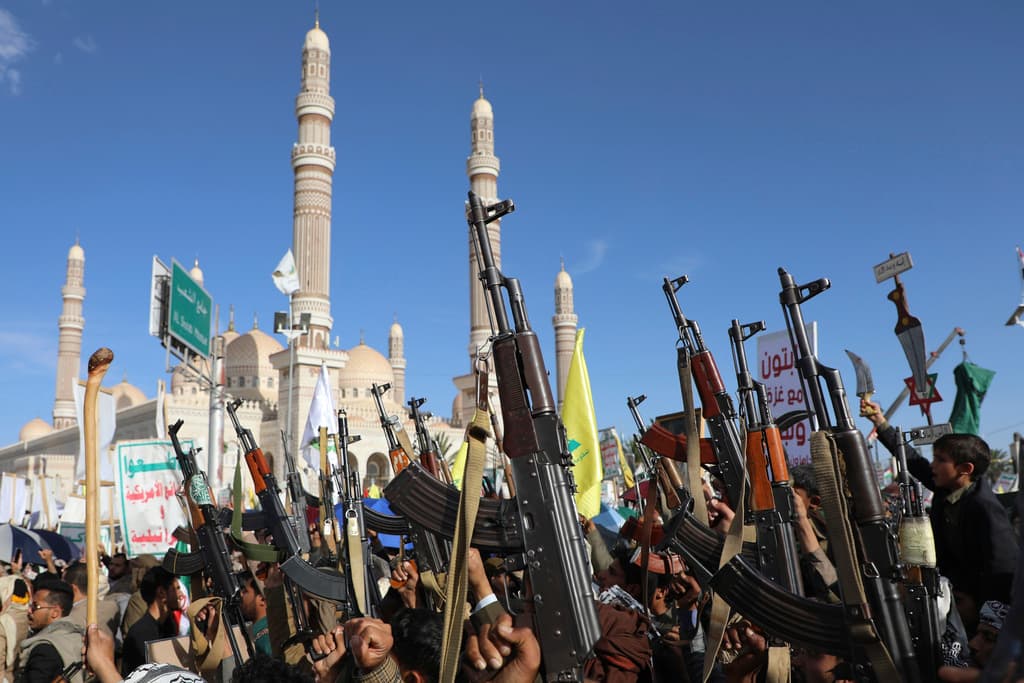Israel, for Now the Leader in the War on the Houthis, Strikes the Iranian Proxy With More Force Than Past Attacks
As officials caution that ballistic missile and drone attacks from Yemen are likely to persist, Jerusalem is indicating that Thursday’s strikes are far from the last word in ending Houthi aggression.

With the aim of being joined by a global coalition, Israel is for now taking the lead in a war on the Houthis. As in a traditional Hebrew military maxim, the Israel Defense Force’s strategy seems to be: “What fails to be resolved by force, will be resolved by more force.”
Thursday’s air strikes on targets in Yemen, including the Sana’a international airport, were more extensive than three prior Israeli operations. Jerusalem officials are indicating that these strikes are far from the last word in the war to end Houthi aggression.
Officials are also cautioning that ballistic missile and drone attacks from Yemen are likely to persist. Thursday’s strikes by the IDF follow increased Houthi attacks, which are nightly triggering sirens in central Israel, alerting sleepy residents that they have a minute and a half to seek shelter.
Even as Israel is taking the lead in battle, it is reportedly awaiting the January 20 inauguration of President-elect Trump before widening the war to include the Houthis’ benefactors at Tehran. For now, Jerusalem is coordinating its military operations in Yemen with America and several Arab countries, according to press reports.
Egypt’s economy, parts of which depend on income from Suez Canal traffic, has been hurt by the Houthi assault on Red Sea shipping. Saudi Arabia fought the Iranian Yemeni ally for a decade before making diplomatic overtures to the Houthis. “Many in the Arab world are quietly cheering Israel’s strikes on the Houthis,” an Arab affairs analyst on Israel’s Kan television, Roi Kais, says.
Israel notified Washington in advance of its Thursday operation. To date, American and British strikes in Yemen mostly targeted missile launchers, as various countries’ navies escort commercial ships in the Red Sea in an effort to reduce Houthi attacks.
Israel, in contrast, is targeting the Houthi economy and preventing Iran from rearming its Yemeni ally. Expect top Houthi leaders to be targeted as well, the defense minister, Israel Katz, said.
“We are determined to cut off this arm of Iran’s axis of evil, and we’ll persist until we complete the job,” Prime Minister Netanayhu told his cabinet Thursday. “We’re just getting started with them,” he added on Channel 14. “Hamas learned, Hezbollah learned, and Syria learned. The Houthis will learn too.”
Thursday’s complex air operation 1,200 miles from Israel’s border was dubbed “Sounds of the Vineyard.” While IDF operations are randomly named by a computer, this may have been a reference to the Yemeni Vineyard, a Tel Aviv neighborhood originally settled by Jews who were rescued from Yemen in 1949 in an operation known as “Magic Carpet.”
At least 25 fighter jets, refueling planes, and reconnaissance craft hit targets such as the Aziz and Ras Qantib power stations, which supply electricity to the country. Also hit were the ports at Hodeidah, Al-Salif, and Ras Qantib, which “were utilized for transferring Iranian weapons and facilitating the arrival of senior Iranian officials,” the IDF said in a statement.
The most significant target, though, was the international airport of Sana’a. No flights were recorded in or out of Yemen afterward. Beyond damaging Iran’s ability to rearm the Houthis via cargo planes, the destruction of the airport’s control tower and runways was designed to dim the Yemeni group’s aura of invincibility.
“We will need to wait for the damage to the airport to be repaired before we can leave,” the World Health Organization’s secretary, Tedros Adhanom Ghebreyesus, writes on X. In Yemen to negotiate the release of United Nations workers taken hostage by the Houthis, the WHO chief was about to leave when the Israeli struck the airport.
Dr. Tedros’s plight will likely be highlighted in a Monday UN Security Council session on Yemen. It was originally scheduled by America, this month’s rotating council president, to highlight the Houthis’ aggression against Israelis. Instead, detractors will use the IDF strikes to allege Israeli harm to Yemeni civilians.
Unlike past strikes in Yemen, the most recent was conducted in daylight. It was timed to coincide with a weekly speech by the Houthi leader, Abdul-Malik al-Houthi, delivered each Thursday at 4 p.m. “The attacks against us will not deter us from assisting our Palestinian brethren,” Mr. Houthi said as Israeli planes started striking.
While Israelis see the Houthis as part of the Islamic Republic’s war-by-proxies strategy, they also acknowledge that the Yemeni group is “operating as an independent terrorist entity with Iranian backing,” as the IDF said in a statement Thursday.
Meanwhile, as Israel debates if and when to hit the Iranian “head of the snake,” it is confident that in the short run it must defeat the Houthis. It is well aware, though, that it will take more than a few air strikes.
“Today we showed our capabilities,” Israel’s air force commander, General Tomer Bar, said as planes returned unharmed from Yemen. He added, “If necessary, we have additional capabilities.”

